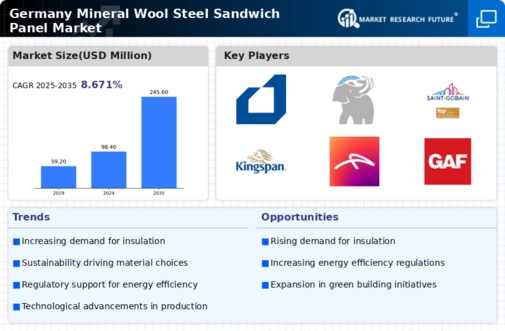Energy Efficiency Regulations
Germany's stringent energy efficiency regulations are significantly influencing the mineral wool-steel-sandwich-panel market. The country has set ambitious targets for reducing energy consumption in buildings, aiming for a 30% reduction by 2030. This regulatory environment encourages the use of materials that enhance thermal performance, such as mineral wool-steel-sandwich panels. These panels not only provide superior insulation but also contribute to lower energy costs for building owners. As compliance with energy standards becomes increasingly critical, the demand for these panels is likely to rise, positioning them as a preferred choice in the construction sector. The market could see a notable increase in sales as builders seek to meet these regulatory requirements.
Rising Construction Activities
The mineral wool-steel-sandwich-panel market in Germany is experiencing a surge due to increasing construction activities across various sectors. The construction industry is projected to grow at a rate of approximately 3.5% annually, driven by both residential and commercial projects. This growth is likely to enhance the demand for efficient building materials, including mineral wool-steel-sandwich panels, which are favored for their thermal insulation properties. As energy efficiency becomes a priority in building regulations, the market for these panels is expected to expand. Furthermore, the German government has implemented initiatives to promote sustainable construction practices, which may further bolster the adoption of mineral wool-steel-sandwich panels in new developments.
Growing Awareness of Fire Safety
The mineral wool-steel-sandwich-panel market is benefiting from heightened awareness regarding fire safety in construction. With recent incidents highlighting the importance of fire-resistant materials, there is a growing preference for products that offer enhanced safety features. Mineral wool, known for its non-combustible properties, is increasingly being specified in building designs. In Germany, regulations are evolving to mandate the use of fire-resistant materials in certain types of construction, which could lead to a significant uptick in the adoption of mineral wool-steel-sandwich panels. This trend may not only enhance safety but also improve the market's overall appeal to architects and builders who prioritize safety in their projects.
Technological Innovations in Manufacturing
Technological advancements in the manufacturing processes of mineral wool-steel-sandwich panels are driving market growth in Germany. Innovations such as automated production lines and improved material formulations are enhancing the efficiency and quality of these panels. The introduction of advanced insulation technologies is likely to improve thermal performance, making these panels more attractive to builders. As manufacturers invest in research and development, the market may witness the emergence of new products that cater to specific building requirements. This focus on innovation could lead to increased market penetration and a broader range of applications for mineral wool-steel-sandwich panels in various construction projects.
Increased Demand for Sustainable Building Solutions
The mineral wool-steel-sandwich-panel market is poised for growth as demand for sustainable building solutions rises in Germany. With a growing emphasis on reducing carbon footprints, builders are increasingly seeking materials that align with sustainability goals. Mineral wool panels, which are recyclable and have a lower environmental impact compared to traditional materials, are becoming a preferred choice. The German construction sector is expected to see a shift towards eco-friendly practices, potentially increasing the market share of mineral wool-steel-sandwich panels. This trend may be further supported by government incentives aimed at promoting sustainable construction, thereby enhancing the overall market landscape.


















Leave a Comment